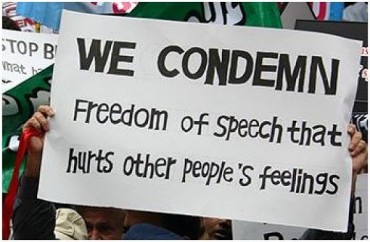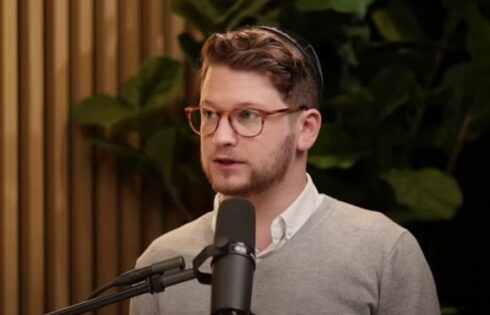
How often have we heard from supposedly intelligent people here in the U.S. that “hate speech is not free speech”?
Of course, such is not the case given our First Amendment.
But in other parts of the world — especially (and regrettably) the West — hate speech isn’t permissible. Take this recent report from the UK which asks “Are racial hate speech laws being ‘weaponised’ against ethnic minorities?”
(The story could also be framed as “Ethnic minorities in a representative democracy must abide by the same laws as the majority,” but that wouldn’t check the “correct” boxes.)
Even the head of Britain’s National Black Police Association, Andy George, worries about this “weaponization” — that laws meant “to protect minorities are in danger of being disproportionately used to prosecute them.”
The report highlights a pair (minority) Brits who have been investigated for hate speech, including an executive who tweeted out a .gif of Daffy Duck tap dancing in response to a tweet about a politician “tap dancing for massa.”
The exec conceded he could “see where [the image] might be offensive,” but added for him it was “hard to grasp” as it was a “political critique” of the politician’s views.
Teacher Mariaa Hussein is also under investigation and was canned from her teaching job after holding a placard showing the UK prime minister and former home secretary underneath a coconut tree. Both politicians are of Indian descent; the coconut represents how the two are “brown on the outside” but hold “white supremacist values on the inside.”
She said while some of her language “may be pejorative, that doesn’t make it racist” — unlike some of the things the prime minister and home secretary have said. She insisted hers was a political statement.
The NBPA’s George said the coconut should not be “seen in the same way” as the n-word or other “highly offensive” racial terms. Nevertheless, his organization believes hate speech laws are “becoming too politicized to police.”
MORE: Michigan ‘hate speech’ bill could criminalize conservative opinion
If these were being investigated in the U.S., unless the judge was a far-left radical they’d be laughed right out of court.
Progressives on U.S. campuses today feel as this Brit exec and Ms. Hussein — that their racist speech isn’t racist, but that of their political and cultural opponents is.
Nothing has brought this double standard to the fore more than the Israel-Hamas war. The same people who want virtually anything that offends them banned and/or canceled have had little-to-no compunction about using the most vile anti-Jewish/antisemitic remarks during pro-Hamas protests.
Seriously, how often have we read about thin-skinned liberals wanting someone investigated/sanctioned/fired for some innocuous word or statement? Just take a gander at The College Fix’s Cancel Culture Database for starters.
Heck, the Harvard Crimson editorial board late last year put out an editorial ripping women’s rights advocate Riley Gaines as “transphobic,” but did note it respects the First Amendment. Then it added that Gaines’ views “do not amount to a get-out-of-jail-free card for hateful rhetoric.” What?
Nothing at that time was uttered by the board on the copious hateful rhetoric from the anti-Israel protesters.
A recent University of Washington student op-ed asked “Is vandalism really all that bad?” because — you guessed it — the cause du jour is a good/correct/just one: the so-called freedom for “Palestine.”
The hypocrisy has become so ridiculous that even the progressive Vox.com had an article up Wednesday sub-headlined “Protecting radical dissent requires tolerating right-wing speech.”
At Columbia, there is another disciplinary code in addition to the student code of conduct, established but two years ago and administered by its Columbia Center for Student Success and Intervention (CSSI). It seeks to “shield students from discrimination and promote the values of ‘Justice, Equity, Diversity & Inclusion.'”
And — surprise! — the CSSI uses a “broader definition of discriminatory speech than either the Rules of University Conduct or federal civil rights law, while providing the accused with few procedural protections.” In addition, the CSSI provides “no right to counsel, bars the accused from making opening or closing statements, and allows the administration to add new charges in the middle of the process.”
Guess what: Columbia used the CSSI process to go after anti-Israel student activists over the last few months, and they, as well as many of their faculty allies, didn’t like it.
Here’s another surprise: Columbia Law Professor David Posen said there’s now a “’growing appreciation’ on campus for ‘the idea that we should countenance a wide range of uncomfortable speech that doesn’t rise to the level of a clear and present danger or target particular individuals.’”
Isn’t that just special.
Vox’s Eric Levitz asks “In light of these [current anti-Israel speech] developments, should students concerned with social justice rethink their previous skepticism of free speech norms, for the sake of better protecting radical dissent? His response: “I think the answer is yes.”
Just skip the first two words, buddy.
MORE: ‘Hate speech’ should be censored online: NYU media professor
IMAGE: Sam Graham/Flickr.com
Like The College Fix on Facebook / Follow us on Twitter







Please join the conversation about our stories on Facebook, Twitter, Instagram, Reddit, MeWe, Rumble, Gab, Minds and Gettr.